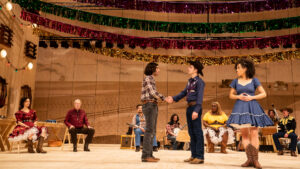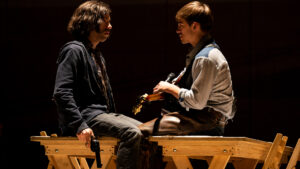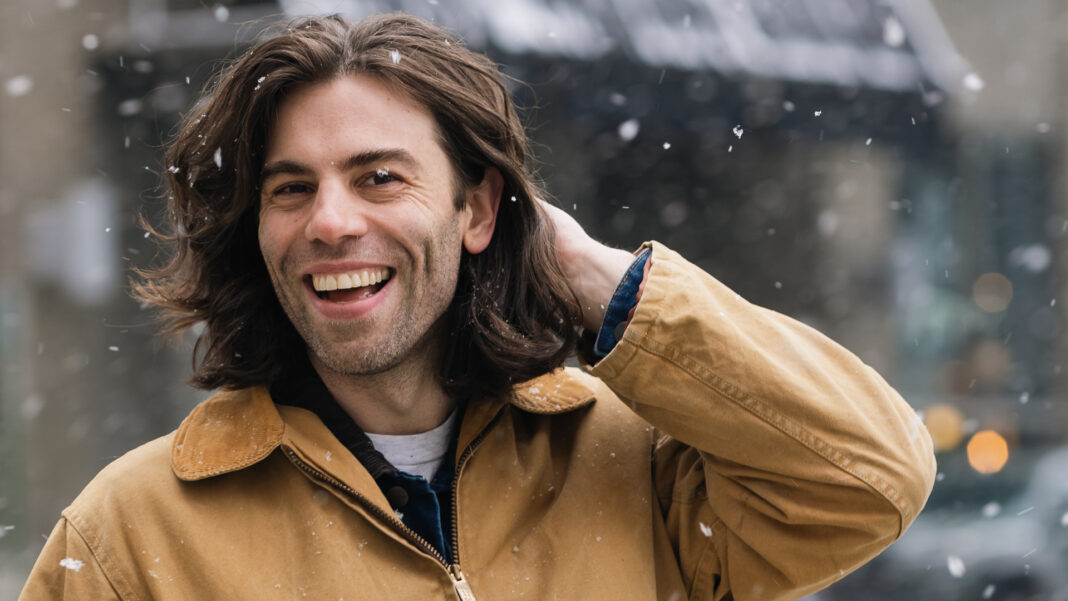In the revival of Rodgers and Hammerstein’s Oklahoma! that is currently at the Ahmanson Theatre in Los Angeles, the “bright golden haze on the meadow” isn’t as bright nor as golden as in previous productions. Director Daniel Fish hasn’t changed any of the text of this classic musical, but he has narrowed the focus on the characters in the show. Amongst them is Jud played by Christopher Bannow.

Jud is the outsider in Oklahoma! He’s a ranch hand who is smitten with Laurey (Sasha Hutchings). But he makes her and everyone around him uncomfortable. Curly (Sean Grandillo) also has his eyes on Laurey and he keeps a watchful eye on Jud and will do anything to make sure he doesn’t end up with her.
Last week I spoke with Bannow about how this production of Oklahoma! is different, what it has to say and how we define what a good guy is in a musical. What follows are excerpts from that conversation that have been edited for length and clarity. To see the full interview, please go to our YouTube channel.
You’ve been on tour with Oklahoma! for quite some time. You also understudied the show in New York. Now that your journey is nearing its end, what do you know about Jud that would surprise your original conception of the character?
I’m lucky. I’ve been able to continue to mine it and discover things throughout the process. I’ve been struck recently just by how much antagonism he faces by doing so very little. This play is full of men pursuing women and there’s a lot of very misogynistic, dominating language that’s used throughout this play by all of the men in it. I’m struck more and more as I listen to the play every night how much of it is allowed for other characters in this play and how little of it is tolerated from from Jud, a.k.a the bad guy, and how little sense that makes. I’m struck by people’s reactions to the role and by people telling me that they’ve seen things that they never thought they’d see in the character because of the particular take on Jud. So that’s been really enlivening and helpful to hear as we’ve been going through the country.
We assume that Curly is the good guy in the show. After all, Hugh Jackman, Patrick Wilson and Alfred Drake have played that role. But is he truly the good guy? He over-zealously pursues Laurey and he makes a truly vile suggestion to Jud.
It is funny feeling the audience from the very get-go be like, Oh, that’s Curly – he should be with the girl. It’s funny to feel that assumption because all of his actions, if you just take them on as they are on paper, he’s a schmuck. He’s a horrible person. He’s giving Laurey a bunch of shit and he’s with another woman at the same time. He tells Jud to kill himself. He’s by no means a perfect gentleman. But for some reason there’s this ideal version of what a man, a western rough and tough man, should be. And Curly embodies that. So regardless of what he says or does, the audience applauds at the end when he and Laurey get together, because that’s the way it’s supposed to be.
Someone saw the show this week and sent me a text and was like, “It’s crazy how it’s such a radical idea for us as Americans to feel empathy for the outsider.” And that’s really why he is the, quote unquote, bad guy – simply because he’s the outsider in this community. And I think in this country, we hold very dear to our identity and our identity is made in part by deciding who is not in our community.
I think that there’s a humanity to Jud that is central to our having empathy for him. What was your process of understanding that that empathy was there and then figuring out how best to get that across to audiences who may just assume that Curly’s the good guy?

I think that I have a natural inclination towards Jud. As an actor I’m drawn to outsiders. I’m drawn to anti-heroes. I’m drawn to people whose convictions are counter to the culture and community that they’re a part of. In this production, it’s funny, I don’t think Daniel and I ever had a real conversation about the inner workings of Jud. I just think that he saw in me, and I saw in in him, this kind of understanding that this human is as complex and as multidimensional as any great character. Neither one of us wanted to diminish him ever to being an antagonist or a villain or the foil to something else.
Every night there’s this moment in the play where I can feel the audience, if they’re truly listening, I can feel this energy shift where they click into the fact that this production isn’t going the way that they thought it would go. This character is going on a journey where they’re not being asked to laugh and point and kind of be afraid of him, but they’re actually locking into his inner workings and a bit of his fear and his hope and his anxiety. I think it really shifts the focus of the story of Oklahoma to being about this community and how they decide who is a part of it and who isn’t. It’s pretty clear by the end of this production that not everyone gets to join the club and Jud, unfortunately, gets kicked out in so many words.
On Tony Sunday in 2019, on your Instagram account, you were asking do audiences celebrate the show for its radical approach? Amongst those questions is, “Is it really radical because it refuses to applaud the audience for coming to see it.” I feel like so much of theater now is placation and the audience is standing as if to say, “Wow, I made it through.” Can you elaborate from an actor’s point of view what you meant by that?
I remember writing that and I remember feeling it. Feeling that this production is the first musical that I had ever seen where the ending wasn’t a kind of celebration of the audience. So much of musical theater, I feel, it’s always about the happy ending. It’s always about and now our story is complete. So it is a bit of placating the audience. Thank you so much for coming. Please buy the cast recording and tell your friends to come as well. They’ve got to see it.
When I experienced the ending of [Oklahoma!] I felt like I was being celebrated, but in a very different way. I feel like this musical at the end is challenging the audiences to receive it. The ending of this is no less engaging of the audience. In fact, I would say it’s probably more engaging than a typical musical. It’s just that the way that it engages the audience challenges them. It asks them to fully receive the images that we are presenting towards them. It’s amazing to see people’s faces because they’re not used to being acknowledged in that way at the end of a musical.
On that same Instagram post you asked a question that I want you to answer. “Are we nervous to have our musicals actually look at our audiences? Is that radical?” I’m assuming you have an answer to that question.

I think it is still radical because I think that any piece of art that truly invites its audience to question themselves, or their state of being, is a radical idea because people don’t like the questions and people don’t like to re-think what they assume they know. If you want to engage with the largest amount of people you’re going to produce something that can be easily digested by the largest amount of people. I think this is just true of musical theater. I think it’s true of any art in the capitalist society where you’re always thinking about marketability as much as you are artistic integrity.
Daniel Fish is a producer’s best dream and worst nightmare because he is going to make something that’s fully engaging. But he’s also never going to apologize for it. He’s not going to back down and he’s not going to water it down, either. I love that because I never know if an audience is going to embrace this musical or hate it because what he’s doing is so personal that there’s no way to know how you’re going to react to it until you see it. I truly think what he’s doing through this classic American musical is probing into personal questions. As a result, people are having to respond to it personally.
Oscar Hammerstein II said, “If you really believe in the brotherhood of man and you want to come into its fold, you’ve got to let everyone else in, too.” It seems like he could have said that about Oklahoma!
If you’re going to celebrate this show as a kind of celebration of identity, then you have to, when you see the show, accept the fact that you’re celebrating this community that is not embracing the fellow brotherhood of man, right? Fully embracing that is acknowledging the fact that we are selective and exclusive and that’s defined our identity. Whether it’s Irish immigrants or Italian immigrants or African-Americans or Hispanics or Asian Americans, the rate of exclusion is just impressive, right? And it’s always changing.
What that tells me is that it’s not actually about who you’re excluding, it’s the act of exclusion. You’re now accepted. Well, now they’re not. It’s this need to push someone away because it’s intrinsically tied to our sense of self as a country. And so if we’re going from what Hammerstein said, then I think this musical is a beautiful way to have many, many, people engage with the truth that when territories become states, they have to push people out.
To see the full interview with Christopher Bannow, please go here.
Oklahoma!, which won the Tony Award for Best Revival of a Musical, continues at the Ahmanson Theatre through October 16th. The US tour concludes in Tempe, AZ at ASU Gammage from October 18th – October 23rd.
Photo: Portrait of Christopher Bannow by and courtesy of Emily Crombez











